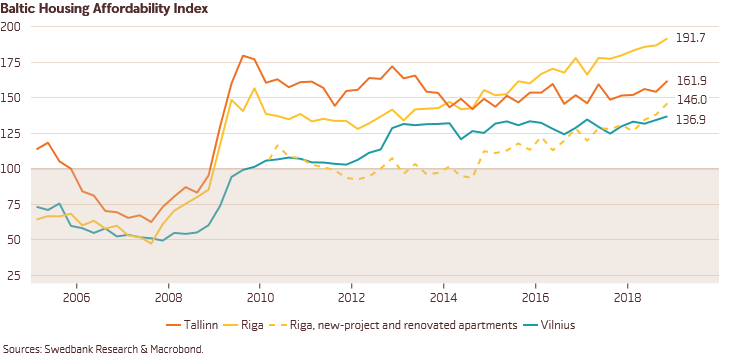The housing affordability index is calculated for a family whose income is equal to 1.5 of average net wages with an average-sized apartment of 55 square meters. The HAI is 100 when households use 30% of their net wages for mortgage costs. When the HAI is at least 100, households can afford their housing, according to the established norm. The higher the index, the greater the affordability
In Riga, the HAI improved by 12 points to 191.7 as wage growth outpaced apartment price growth. For new-project and renovated apartments, the HAI increased by 15.2 points to 146.0.
"The HAI value of 161.9 in Tallinn means that the net wages of a household in this city are 61.9% higher than required to afford an apartment, according to our norm (mortgage costs account for 30% of the net wages of a household that earns 1.5 of the average net wage). Meanwhile, in Riga, household net wages are 91.7% higher (46.0% for new-project and renovated apartments) — and, in Vilnius, 36.9% higher — than required to fulfil the norm," said Swedbank.
"In 2018, the HAI improved considerably in Riga, including for new-project and renovated apartments, though the affordability level is lower for these apartments. Rapid average net wage growth, which outpaced the average apartment transaction price growth, was the defining factor behind higher affordability," it said.
Because of earlier rapid price growth, the value-for-money perception of Soviet-era apartments seems to have deteriorated, though Soviet-era apartments continue to dominate real estate activity in Riga. Meanwhile, activity and the average price of new-project and renovated apartments in the suburbs continued to trend upwards on the back of firm demand and rising construction costs.
"In 2019, we expect that the HAI (including for new-project and renovated apartments) will continue to improve, albeit in a slower pace. Wage growth is expected to slow as the effect from the labor tax reform and minimum wage hike dissipate, but the average apartment price will likely sustain a similar growth rate as in 2018," the bank predicted.

The number of months needed to save for a down payment, which equals 15% of an apartment price, decreased in all Baltic capitals over the year. It decreased by two months in Tallinn, by one and a half months in Riga (three and a half for new-project and renovated apartments), and by three months in Vilnius, to 26.9, 22.5 (29.5), and 32.8 months, respectively. Growth in wages outpaced that in apartment prices, thus determining the decrease




























